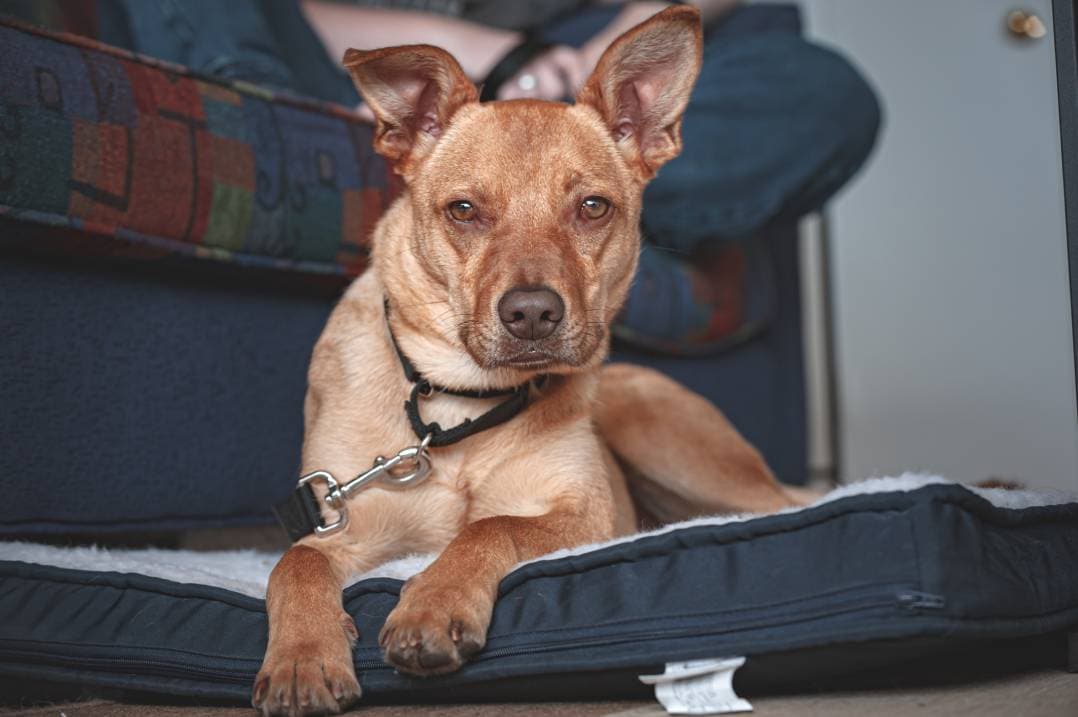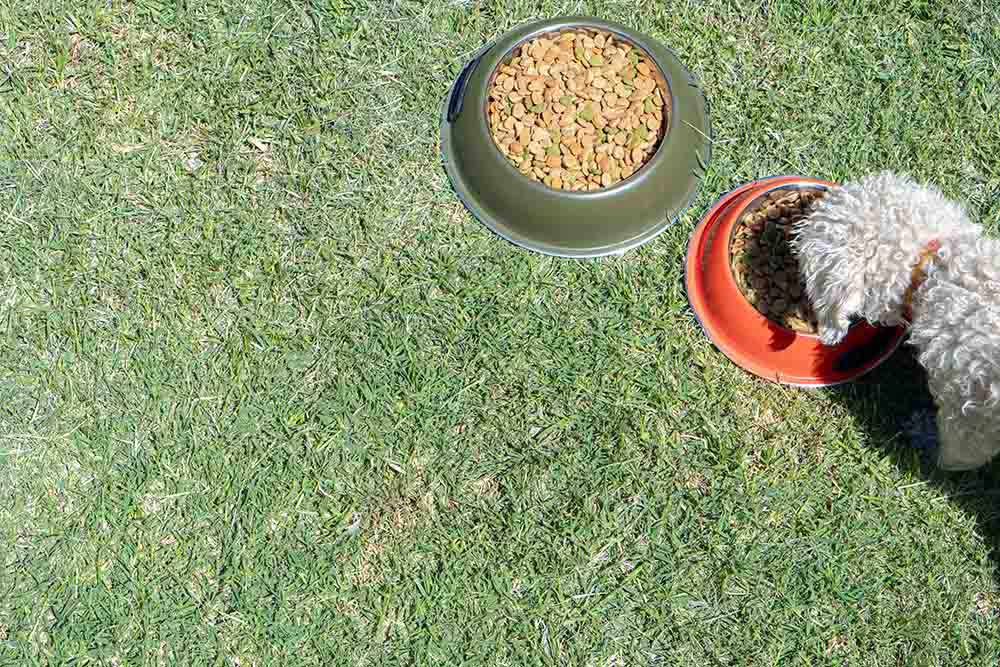Bahamian Potcake Dog: Are They the Real Breed?
By Jordyn Alger
Updated on

Chances are, you may have just recently heard about the Bahamian Potcake dog. There’s a reason for that: the Bahamian Potcake is not an officially recognized breed through the American Kennel Club. This dog is a mixed breed originating from several Caribbean islands, and it is named after a traditional dish of pigeon peas and seasoned rice cooked in a pot to form a “pot cake.” The pot cake would often be mixed with leftovers and fed to the dogs, thus the name Bahamian Potcake.
| Height: | 22–24 inches |
| Weight: | 45–55 pounds |
| Lifespan: | 10 years |
| Colors: | Black and tan, brown, beige, white, black |
| Suitable for: | Experienced dog owners and moderately active families |
| Temperament: | Sensitive, affectionate, intelligent, and obedient |
Since it is a mixed breed, appearances vary, but generally, the Bahamian Potcake has a smooth coat, a long muzzle, and cocked ears. It is a medium-sized dog that comes in a variety of colors, and it is known for having an excellent temperament.
If you are curious to know more about the Bahamian Potcake and what it would look like to own and care for one, this article has an overview of everything you need to know.
Bahamian Potcake Dog Characteristics
 Bahamian Potcake Puppies – Before You Bring One Home…
Bahamian Potcake Puppies – Before You Bring One Home…
If you provide Bahamian Potcake puppies a stable home and give them basic training, they can become wonderful pets.
Since these dogs are very intelligent and adaptable, they will fit into your home after a short adjustment period. The puppies are easily housetrained and positive reinforcement obedience training goes a long way with them.
Despite their street origin, Bahamian Potcakes can develop an immediate bond with their human parents. They are rarely shy and prefer to be around people as much as possible.
 Temperament & Intelligence of the Bahamian Potcake Dog 🧠
Temperament & Intelligence of the Bahamian Potcake Dog 🧠
The Bahamian Potcake is known to have an excellent temperament. This breed is intelligent, loyal, and incredibly affectionate. They are resilient and calm, and they are also remarkably adaptable. Many Bahamian Potcakes can be independent and may be prone to wandering off when you are not paying attention, so make sure that you always keep a close eye on your dog.
Although this breed has energy, they are also eager to cuddle up on the couch and relax with you. This makes them versatile companions for moderately active families.
When it comes to intelligence, the Bahamian Potcake’s keen mind cannot be ignored. This breed is capable of learning new tasks and equipped with unique street smarts.
Are These Dogs Good for Families? 🏡
Some people may shy away from the Bahamian Potcake due to its street dog origin story; however, this shouldn’t deter anyone from this lovable pup. The Bahamian Potcake is an ideal companion. They tend to have an instant and intuitive connection to their families with a unique, empathetic bond that makes them stand out among other breeds. They love being around their families and never shy away from expressing affection.

Does This Breed Get Along With Other Pets? 🐶 😽
Bahamian Potcakes are generally known to get along well with other dogs. This is especially true if they are adopted from Bahamian Potcake rescue organizations, where they tend to be fostered by households with other animals present.
Of course, proper introductions and socialization are important when introducing any breed to a new pet. Although Bahamian Potcakes tend to be great with other pets, there can be some unpredictability in their personality due to their unclear genetic pool.
 Things to Know When Owning a Bahamian Potcake Dog:
Things to Know When Owning a Bahamian Potcake Dog:
Food & Diet Requirements 🦴
Bahamian Potcakes are medium-sized dogs, so a diet suitable for a medium breed will sustain them. Like any dog, the Bahamian Potcake needs a balanced diet to ensure proper nutrition.
Bahamian Potcakes tend to be much less picky eaters than other breeds. They have tough stomachs, likely due to their experience in the streets. They can eat many foods that other breeds would shy away from, but that does not mean you should feed human food to your Bahamian Potcake. Even if Bahamian Potcakes have stronger stomachs than the average breed, that does not mean that strength should be tested. Even the Bahamian Potcake’s tummy has its limits.

Exercise 🐕
The Bahamian Potcake is an active dog, although they do not require vigorous exercise. Two walks per day are sufficient to burn off their energy, along with some occasional time for play.
Mental stimulation is vital to keep any dog’s mind active. Interactive toys or treat mazes can be great ways to keep your Bahamian Potcake’s mind sharp.
Training 🦮
The Bahamian Potcake is an intelligent, adaptable dog. This makes them relatively easy to housetrain.
Harsh words or punishments do not work with the Bahamian Potcake, so they should be avoided. Using positive reinforcement is the best way to train a Bahamian Potcake dog. The Bahamian Potcake is highly motivated by food and toys, and they are ideal for rewarding the behavior you aim to reinforce.

Grooming ✂️
The grooming needs of the Bahamian Potcake tend to be minimal. Regular brushing will help to keep the coat shiny, nourished, and clean. Bathing should be done monthly or as needed. The ears should be cleaned and checked regularly for signs of infection, and the nails should be clipped every month. Whenever you hear your Bahamian Potcake’s nails clicking against the floor, you will know it is time to trim them.
Health and Conditions ❤️
Since the genetic origins of the Bahamian Potcake are unclear, it can be difficult to tell which health conditions they may be predisposed to. However, it is generally believed that the Bahamian Potcake tends to be healthy.
Conditions that are common among any breed of dog will also apply to the Bahamian Potcake. Below are some complications you may want to watch out for.
Serious Conditions:
No one wants to consider the possibility of their beloved dog developing cancer, but it is an unfortunate reality for many dogs. Over half of all dogs over the age of 10 will develop cancer, so it is not uncommon. The most frequently seen cancers tend to be skin cancer, lymphoma, and bone cancer.
Minor Conditions:
Dental disease is common among dogs, and while it can be a minor condition if treated promptly, it can develop into something much worse. The best way to prevent dental problems in dogs is to check and clean your dog’s teeth regularly.
Another common condition in dogs is hot spots. Hot spots are inflamed skin lesions that generally appear around the head, legs, and hips, but they can be found anywhere.
Ear infections may also be an issue for your Bahamian Potcake. Around 20% of dogs have an ear condition, so checking your dog’s ears frequently is essential.
Male vs Female
There do not appear to be significant differences between the male and female Bahamian Potcake. Most differences between any two Bahamian Potcakes will likely be attributed to their uncertain ancestry or personality.
The 3 Little-Known Facts About Bahamian Potcake Dogs
1. The Bahamian Potcake Is an Officially Recognized Breed in the Bahamas
Although the Bahamian Potcake has sadly not been acknowledged by the American Kennel Club, it has been acknowledged in the Bahamas. It was officially recognized in the 1970s, and it is a fairly popular dog. There, it is known as the Royal Bahamian Potcake.
Today, the popularity of the Bahamian Potcake is gaining traction in the United States due to rescue efforts as well as programs for spaying and neutering the wild Bahamian Potcakes to control the feral population.
2. The Bahamian Potcake’s Gene Pool Is Unclear
It makes sense when you think about it; the Bahamian Potcake’s gene pool is unclear due to its origins as a street dog. There is a significant possibility that the Bahamian Potcake is descended from the Arawak dog, but that is still not certain.
There is also a good chance that the Arawak genes never made it into the Bahamian Potcake’s genetic pool because they may have died off before the interbreeding could occur. Other candidates for the Bahamian Potcake’s ancestry are Carolina dogs and terriers.
3. Bahamian Potcakes Have a Tendency to Wander
Bahamian Potcakes are known to have “roaming in the blood.” This means that they have a deep desire to wander or run off whenever given a chance. For this reason, it is important to keep any Bahamian Potcake in an enclosed area or on a leash when outdoors.
Bahamian Potcakes are incredibly adaptable and can be trained effectively with gentle, positive reinforcement to prevent wandering. You will need to start the training when your Bahamian Potcake is young, or they may not listen to you when you try to call them over.

 Final Thoughts
Final Thoughts
The Bahamian Potcake is a unique dog with a lot of glowing qualities. Any family can find a great companion with the Bahamian Potcake, as the breed is known for its great temperament, intelligence, and affection.
If you want to bring a Bahamian Potcake into your family, you will need to contact one of the Bahamian Potcake adoption shelters to ask if there are any available dogs to adopt. From there, the shelter will guide you through the next steps needed to bring your new furry friend home.
See also:
- Miniature American Shepherd: Breed Info, Pics, Puppies, Traits
- Greyhound & German Shepherd Mix: Info, Pictures, Personality
Featured Image Credit: Paul Sveda, Shutterstock
 Bahamian Potcake Puppies – Before You Bring One Home…
Bahamian Potcake Puppies – Before You Bring One Home… Temperament & Intelligence of the Bahamian Potcake Dog 🧠
Temperament & Intelligence of the Bahamian Potcake Dog 🧠 Things to Know When Owning a Bahamian Potcake Dog:
Things to Know When Owning a Bahamian Potcake Dog:










